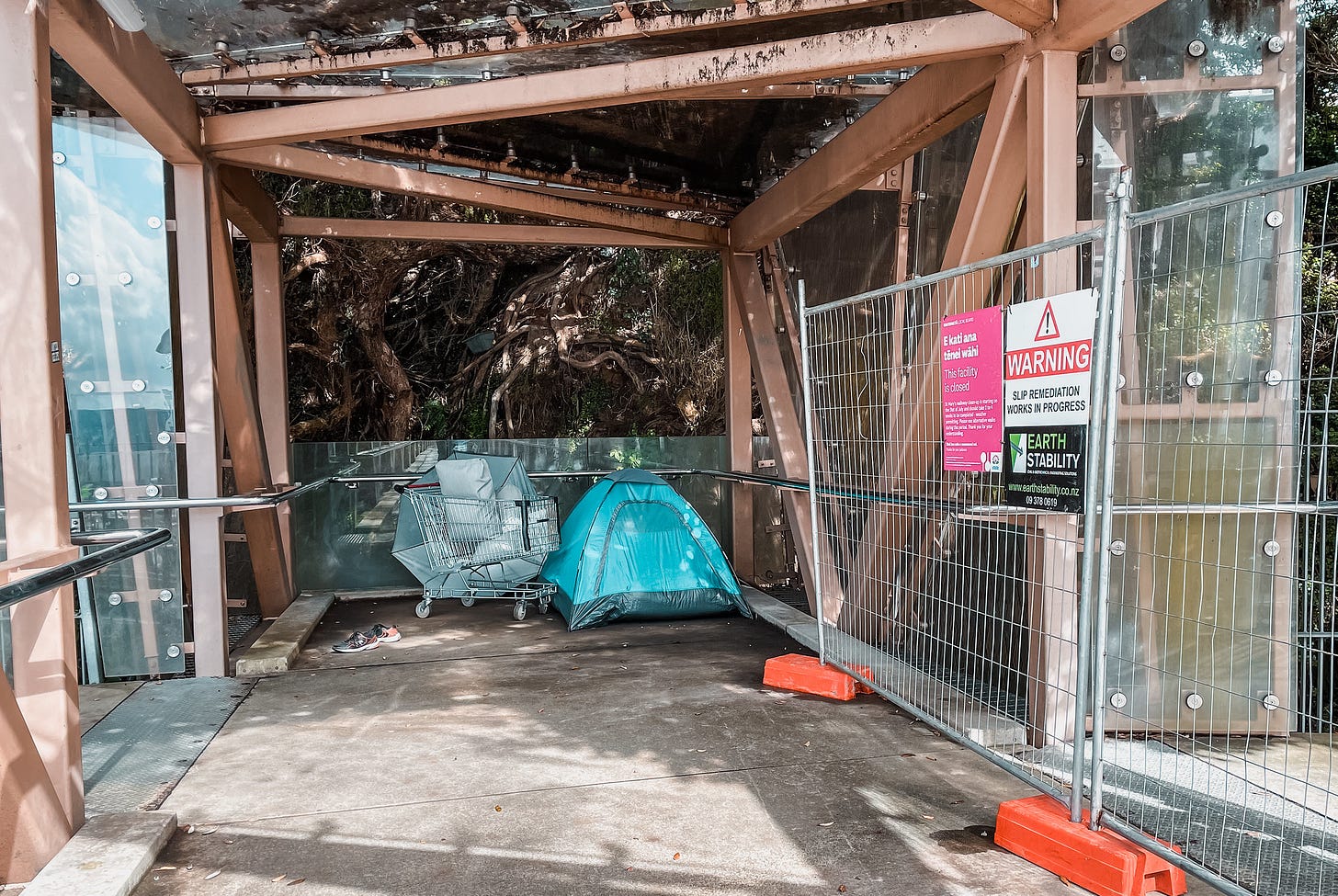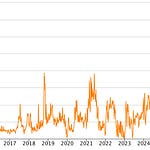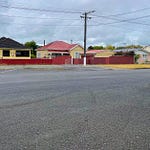
TL;DR: The top six things I’ve noted around housing, climate and poverty in Aotearoa’s political economy today are:
Decades of underinvestment at the same time as record-high population growth have stressed housing, water, education and health infrastructure to breaking points all over the motu, which the new Government’s spending freezes are exposing and worsening;
School principals, hospital administrators, council water network operators, consenting officers are all now chasing their tails, having to cut back on spending just as an avalanche of long-delayed maintenance and replacements arrive to compound the issues;
Yet the debates about Government spending, investment and taxation arrangements ignore the fundamental gaps and non-decisions that keep escalating these infrastructure deficits, which already estimated at over $100 billion and rising towards $200 billion;
Our body politic still believes we can have small Government, low public debt, no taxation of capital gains and mostly universal public services at the same time as rapid and unacknowledged population growth;
That combination cannot compute without both the rolling collapses of those public services and an exodus to Australia of the (young, working and renting) losers in this current settlement of our political economy; and,
Political debates and election contests both locally and nationally that acknowledge and address the population, taxation, inequality and productivity elephants in the room are necessary to break the spells of magical thinking and collective ignorance that have created this now-unsustainable collection of crises around housing, climate and poverty.
(Full paying subscribers can see and hear more detail, analysis and commentary in my podcast above and below the paywall fold. They also get sent the full daily Pick ‘n’ Mix and Journal of Record emails. If we get more than 100 likes, we open these articles up for full public access and sharing online. Join our community of paying subscribers to also be able to comment and get access to our ‘Hoon’ webinars. Updated: Achievement unlocked! Open now for full public listening and sharing.)
Top Six Things to note today:
1. We’re chasing our tails in our polycrises of infrastructure
Onslow College and Greytown consenting closure the latest examples
Three deeply-reported features on our housing, poverty and climate crises reinforced to me over the weekend the cascading and self-reinforcing nature of our infrastructure and population deficits that demand we challenge the current assumptions about our size of Government, who pays for infrastructure and whether we tax capital gains on residential land.
This is the Must Read from today’s Pick’n’Mix that reinforces the point: ‘Father and son live in a tent in Mt Maunganui, and have done for four years, in a million dollar suburb. Because of their living situation, the boy cannot enrol in school.’ Stuff’s Annemarie Quill.
The detail is just awful and comes against a background of a local election over the weekend, which was all about local home owners rebelling against high population growth that means they have to pay for the infrastructure that would build the houses necessary for all the extra people.
Ice has never attended school and Moeau has been teaching him.
“I would like him to go to school, and be with people his own age, but for that we need a house. I don’t want Ice to go to school and have to tell people he lives in a tent.”
The pair have no hot water, and use public toilets near the park.
“How can I send him to school in a clean uniform when we don’t even have hot water to shower or wash clothes?”
“I connected a hose at one point to a public water tap, just so we could wash even though it was cold water but someone complained.”
He’d like Ice to be able to go to school soon so he will be ready for intermediate.
“He’s super brainy in reading, writing, mathematics. I’ve taught him lots of things, but he needs to be with other kids, and do sports, have a normal life.”
They have got used to the cold, he says.
“We have blankets. The worst is when the tent gets waterlogged - if that happens we have to sleep in the car until it dries out.”
In my view: Aside from the awfulness of the living situation and the clear way inequality is passed on and amplified because of a housing shortage, the implications for school access are devastating.
Jocelyn Mikaere, deputy secretary at the Ministry of Education said to enrol at a school, the parent must state the student’s usual place of residence.
“If a family has no fixed abode, consideration will be given to the family’s particular circumstances and the local Ministry team will work with the family, local schools and other government agencies as required to ensure the child has access to schooling.”
It’s schools as well as houses
This deep dive from The Post-$$$’s Luke Malpass is another version of the same story. ‘When Chris Hipkins visited Onslow College in 2019 he had good news. Five years later there are no classrooms, leaks and broken promises.’
Mouldy classrooms; leaky roofs; gaps in windows so big you can put your hand through; a roof built over a roof, a gymnasium that can’t be used, and visitor parking smack bang in the middle of the school. Blocks and classrooms identified for replacement since 2013 are still there.
Welcome to Wellington’s Onslow College. A growing school of 1400 students in an electorate with the highest proportion of high salary earners in the country, it is also crumbling and decrepit.
“When it rains and it's windy, I wake up at two in the morning, and I think to myself, ‘What the hell am I going to arrive to?’ says principal Sheena Millar.
“I better get to school before other people get to school, to make sure that I have got people in drying carpets, cleaning up...
“I’m sick to death of asking the question, should [the school] open? So actually, it becomes is an enormous part of what you're thinking about and what you're dealing with on a daily basis.”
“I think basically what has happened is we've had identification of buildings that are no longer fit for purpose that go back to 2013. We've been told that they're going to be demo-ed, we're going to get new buildings. So when you're told that, you don't spend money on them yourselves either,” she says.
“And what we have are stop-gap measures to try and keep buildings that have got Stachybotrys in them, have got leaking in them, have got issues that we can't fix in them.
“Kids have had year after year of being told they're going to get new buildings, families have been told they're going to get new buildings and they're just not here.”
Land costs too much, so just move the house and commute instead…
Then there’s this piece via RNZ’s Checkpoint about a 22-year old who chose to move a house from Lower Hutt to a cheaper section in Featherston and then commute back to Lower Hutt.
The once-rundown character cottage that used to sit in Lower Hutt is now in Featherston. He said he chose to relocate the cottage to Featherston due to being close to Lower Hutt.
"It just seemed right to be a little bit closer to the city where you know there's a lot of my work."
In my view: The irony of having to move a house off land in Lower Hutt to Featherston because of land costs and then justifying Featherston because it was ‘close’ to Lower Hutt shouldn’t be lost on anyone. Also that Wairarapa’s Council has just stopped new housing connections to the sewerage systems in Martinborough and Greytown because of a lack of capacity, but it’s still open in Featherston.
2. That sprawl works, until it doesn’t
A piece of news late last week may have slipped past a few people, but it’s important because it illustrates the current failure in infrastructure.
Wairarapa has just stopped allowing new builds in both Greytown and Martinborough, as reported here via 1News and LDR’s Emily Ireland.
Growth has ground to a halt in Greytown — with the council putting a stop on new wastewater connections because the treatment plant is at capacity. It means plans for a 200-lot development, which would have grown Greytown's population by 10-15%, would not go ahead until the matter is sorted.
The district's mayor says he has "no concerns" about the stop to connections and that it would "be a mistake to overreact" to the news.
"Quite clearly we do need to make sure we have infrastructure in place before growth," he said.
Consents and permits that have already been approved will be honoured, as would consents that are in the process of being approved, he said.
The council also put a halt on new wastewater connections in Martinborough last year, leaving just Featherston open to new urban growth.
Councils being ‘set up to fail’
LDR’s Emily Ireland also reports via The Post-$$$ on the impossibility of allowing very fast population growth that has to be funded by taxpapers, while central Government banks the GST and income taxes to reduce its own debts and reduce taxes centrally.
Wairarapa-based Labour MP and former Local Government Minister Kieran McAnulty said councils had two choices, “they either significantly increase rates or they don’t do the work”. Many choose the second option.
Local Government Minister Simeon Brown said the halt on new wastewater connections in Greytown “shows the importance of local councils investing for growth”.
But McAnulty said “the blame towards council is misplaced” and if rates continue to be the only source of funding for councils to invest in water infrastructure, the issue was only going to get worse.
My expectation is the council will work closely with those affected, including housing developers, to provide them with a clear timeframe for when wastewater capacity will be increased,” he said.
“While this is a matter for the council to address in the first instance, the coalition Government is addressing widespread constraints on housing growth related to water services capacity through Local Water Done Well.”
But McAnulty said “the blame towards council is misplaced” and if rates continue to be the only source of funding for councils to invest in water infrastructure, the issue was only going to get worse.
“Rates affordability is shaping up to be the biggest issue for households and the Government hasn’t done anything to improve it,” McAnulty said.
He said the coalition Government’s Local Water Done Well plan would only lead to more council-controlled organisations similar to Wellington Water being established, and it was clear this model “is not working for South Wairarapa”.
“This government is setting councils up to fail,” he said.
3. The undebated assumptions and elephants in the room
So how did we get here?
This is all about the undebated assumptions shared by both major parties about the size of Government relative to the rest of the economy, the size of public debt relative to the economy and to do it with the magical thinking that Aotearoa can continue to have the currently promised universally-available public services such as education and health, and a universal NZ Superannuation indexed to 66% of average wages.
Those assumptions are:
The size of Government should always stay below or trend back to below 30% of GDP;
The size of net public debt should also stay below or trend back to 30% of GDP;
That it is realistic to continue to have universally available and publicly funded, schools, hospitals and roads, along with a universal benefit for over 65s at two-thirds of average wages;
That all this can be down while continuing not to tax the main source of fast-growing household wealth, which are capital gains on residential land; and,
That all the above is also sustainable with ongoing population growth of 1.5-2.0 per annum, even though the publicly forecast and most-used assumption for population growth by planners is less than half that.
4. The circle cannot be squared. The centre will not hold.
This oingoing attempt to triangulate the impossible has led the major parties down cul de sacs of magical thinking that include a variety of politically or economically impossible assumptions when believed all at once, such as:
That ‘someone else’ or ‘something else’ can always pay for this infrastructure and these services;
That councils and the Government can and will keep squeezing ‘efficiency gains’ out of existing staff and assets to deliver more services and keep the assets functional for longer without extra investment or spending, and that this can happen until the end of time;
That the private sector in the form of banks, fund managers and ultimately individual consumers will provide the revenue and capital to grow and/or repair the existing assets through Public Private Partnerships, public asset sales, sale-and-lease-back arrangements that are somehow cheaper and more publicly accountable than assets and services paid for by Government and council borrowing and staff; and,
That consumers will be happy to pay water charges, road tolls and congestion charges to fund repairs and growth, when they previously haven’t had to directly and believe they’ve already paid once-over for the assets.
The underlying political judgement behind this magical thinking is that the median voters that decide elections, who are overwhelmingly older, home-owning families in the leafier suburbs of our major cities, will not tolerate the taxes on capital gains and/or the higher mortgage rates implied by taxing those capital gains and/or using more Government borrowing to pay for the infrastructure.
The political framing of this magical thinking is always based on the ideas that:
Public servants are lazy and wasteful;
Councils are reckless and hopeless;
Beneficiaries of the non-universal benefits don’t deserve those benefits and can live just fine without troubling anyone else or using public services more when they aren’t paid those benefits;
Beneficiaries of the universal benefits do deserve them and they can never be changed;
It is of course a good thing for the Government to have lower debt in order to allow households to have higher debt with lower interest rates, in order to buy and leverage more residential land for tax-free capital gains;
No one will leave the country in despair if they don’t benefit from this political settlement because New Zealand is such a nice place filled with lovely people and will always have better living standards than elsewhere; and,
There’s always more fat in the system to keep it resilient and able to handle shocks.
5. So how is that magical thinking working out?
Residents who rent and work are voting with their feet by leaving to live in Australia and elsewhere. Many have given up on voting or never started voting, believing there was no real alternative to the set of magical assumptions above. Remember that the Green Party committed to keep net debt below 20% of GDP and the size of Government below 30% of GDP before the 2017 election.
The news of the day is dominated by signs the infrastructure is stretched to breaking point and pieces of it are now breaking and cascading down in feedback loops to break other bits of the infrastructure. See today’s Pick ‘n’ Mix for at least 20 examples across housing, health, education, Police, Justice and social services to see the evidence.
6. So what can we do now?
We can challenge those assumptions above and decide what type of triangulation actually works in terms of:
the size of government, size of Government debt;
who pays to build and run public infrastructure and services;
the nature of population growth and how we plan and build for that; and,
the types of public services we agree we can sustainably have in the long run.
This should happen during an election. I’ll have a think about how The Kākā could contribute to these debates through assessing and proposing solutions that are coherent and realistic.
The best of the rest
Also, my Pick ‘n’ Mix for July 22 of the top six news, analysis, deep-dive and opinion links elsewhere include:
Today’s Must Read: Father and son live in a tent, and have done for four years, in a million dollar suburb. Because of their living situation, the boy cannot enrol in school. Stuff’s Annemarie Quill.
News: Why growth has ground to a halt in Wairarapa town 1News LDR’s Emily Ireland
News: Land sat empty for 14 years, and not a ‘boutique retirement village’ in sight. Ryman Healthcare has now sold the prime Wellington land to a new owner. Stuff’s Laura Frykberg
Deep Dive: Mould, leaks and now back to the drawing board for Wellington school. When Chris Hipkins visited Onslow College in 2019 he had good news. Five years later there are no classrooms, leaks and broken promises. The Post-$$$’s Luke Malpass
Deep Dive: Big argument over a tiny house: Stand-off leaves couple homeless. A dramatic dawn visit with an angle-grinder was the latest step in an angry dispute between a couple and their landlord over their tiny house. Stuff’s Steve Kilgallon
Solutions News: Talks underway for specialist GPs to diagnose and treat ADHD RNZ’s Luka Forman
The Journal of Record today
Also, The Kākā’s Journal of Record for July 22 included these top six items:
US President Joe Biden announced via X this morning he would not stand for a second term.
Multinational professional services firm GHD released research showing that one in five NZers spend over 50% of household income on mortgage or rent
Simeon Brown announced the NZTA has begun work to replace nine state highway bridges with new increased-capacity structures.
Winston Peters gave a speech at the Pacific Islands Forum Leaders Meeting to discuss NZ’s “foreign policy reset.”.
The Health and Disability Commissioner released a report analysing five years of complaints it's received about residential disability support services.
Meridian Energy announced that the Harapaki Wind Farm, able to power around 70,000 homes, was now fully operational.
And finally, some fun things
Cartoon of the day
A glitch in the machine

Timeline-cleansing nature pic
‘What? You don’t like me sandy? Don’t throw the stick in the sand then.’
Mā te wa
Bernard
















Why we have to challenge our national fiscal assumptions